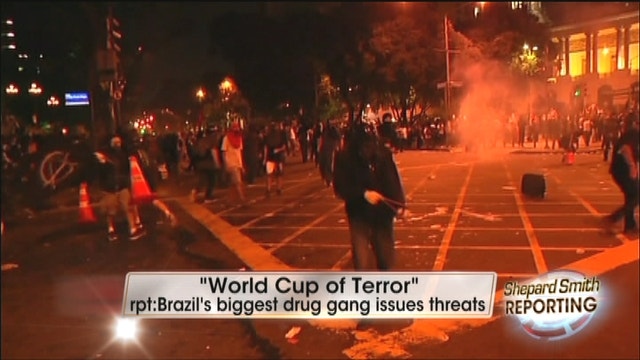Brazil's Largest Gang Threatens 'World Cup Of Terror'
The largest and most organized criminal organization in Brazil has threatened to unleash a
The largest and most organized criminal organization in Brazil has threatened to unleash a "World Cup of Terror" during the world's biggest soccer stage in the summer of 2014.
Just eight months before Brazil hosts the World Cup, Brazilian police have intercepted phone calls using wiretaps from the First Capital Command (PCC) drug cartel threatening a series of attacks during the World Cup if the government decides to transfer some of its gang members to prisons spread across the South American country, according to Brazilian newspaper Estadao.
The PCC was formed in Sao Paulo, Brazil's largest city, and operates within the country's prison system. Using cell phones, lawyers and corrupt officials, the criminal gang has managed to grow to an estimated 11,000 members and gain control of the country's major drug trafficking routes between Brazil, Bolivia, and Paraguay.
The threat is being taken seriously by Brazilian police who are tracking the threats and are currently locked in a street war with the gang. The PCC murdered 106 members of the Military Police in 2012 after revenge attacks were ordered by the gang in response to the execution by police of suspected gang members.
But law enforcement authorities said it’s highly unlikely the threat will affect the World Cup games and said it shouldn’t deter anyone from visiting the country next year.
“It is a group that should be taken seriously and being fought like any criminal organization,” Sao Paulo’s public security office said in the statement. “However, the information gathered so far by intelligence services does not point to any indication that any attack will occur. This is not the time to generate alarmism.”
However, the Sao Paulo police chief has asked his men to be extra careful when parking their cars and traveling home.
The threats are just the latest concerns before the World Cup opens on June 12th in Sao Paulo. Brazil has promised FIFA to complete 12 new World Cup stadiums and, according to government numbers, six of the stadiums have yet to be completed and five are only 90 percent completed. The country has also been plagued with violence and protests by Brazilians fed up with rampant corruption and frustrated with the enormous resources the nation is allocating to prepare for the World Cup.
These days, there is a nationwide movement against government spending.
Teachers are currently striking in many states in Brazil, calling for better work conditions and salary increases. On Tuesday night, in Sao Paulo, groups of university students joined teachers protesting for higher wages. Police reported that four police officers were injured, seven banks were vandalized and at least 56 people detained before the clashes between police and masked demonstrators ended.
The government is investing an enormous amount of money, an estimated $14 billion to host the World Cup, during a time in which Brazilians feel the country should be investing in public infrastructure and public salaries.
“The government is exercising imminent domain and taking over the slums to use the land for sporting infrastructure and that is producing enormous resentment,” Larry Birns, director of the Council of Hemispheric Affairs, said of Brazil’s efforts to clean up their slums and rid areas of violent gangs. “It is harvesting a lot of problems from its past. It’s not that these things don’t need to be built, but it’s being built without the consultation of local people and, in a way, that alienates the poor.”
Critics have said World Cup preparations are benefiting the rich at the expense of the country’s poor.
“It’s a bittersweet thing,” Birns said about how Brazilians feel about hosting the World Cup. “They are trying to do decades worth of work in a year’s time.”
